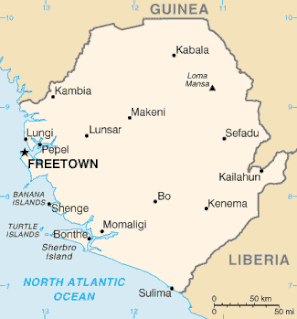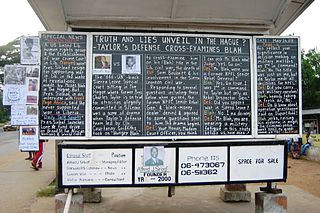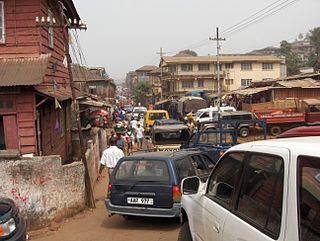
The United Nations Mission in Sierra Leone (UNAMSIL) was a United Nations peacekeeping operation in Sierra Leone from 1999 to 2006. It was created by the United Nations Security Council in October 1999 to help with the implementation of the Lomé Peace Accord, an agreement intended to end the Sierra Leonean civil war. UNAMSIL expanded in size several times in 2000 and 2001. It concluded its mandate at the end of 2005, the Security Council having declared that its mission was complete.

United Nations Security Council resolution 1389, adopted unanimously on 16 January 2002, after recalling all previous resolutions on the situation in Sierra Leone, the Council expanded the mandate of the United Nations Mission in Sierra Leone (UNAMSIL) to include wide-ranging provisions for supporting the May 2002 general elections.

United Nations Security Council resolution 1400, adopted unanimously on 28 March 2002, after recalling all previous resolutions on the situation in Sierra Leone, the Council extended the mandate of the United Nations Mission in Sierra Leone (UNAMSIL) for a further six months until 30 September 2002 in the run up to the May 2002 general elections.

United Nations Security Council resolution 1508, adopted unanimously on 19 September 2003, after recalling all previous resolutions on the situation in Sierra Leone, the Council extended the mandate of the United Nations Mission in Sierra Leone (UNAMSIL) for six months until 31 March 2004.

United Nations Security Council Resolution 1940, adopted unanimously on September 29, 2010, after recalling all previous resolutions on the situation in Sierra Leone, including resolutions 1132 (1997) and the 1171 (1998), the Council lifted an arms embargo and remaining sanctions against the country imposed in 1997.

United Nations Security Council Resolution 1941, adopted unanimously on September 29, 2010, after recalling all previous resolutions on the situation in Sierra Leone, particularly Resolution 1886 (2009), the Council extended the mandate of the United Nations Integrated Peacebuilding Office in Sierra Leone (UNIPSIL) until September 15, 2011.

United Nations Security Council resolution 1562 was adopted unanimously on 17 September 2004. After recalling all previous resolutions on the situation in Sierra Leone, the Council extended the mandate of the United Nations Mission in Sierra Leone (UNAMSIL) residual presence for a period of nine months until 30 June 2005.

United Nations Security Council Resolution 1971, adopted unanimously on March 3, 2011, after recalling previous resolutions on the situation in Liberia and Sierra Leone, including Resolution 1626 (2005), the Council requested the United Nations Mission in Liberia (UNMIL) to withdraw its military personnel providing security for the Special Court for Sierra Leone, and placed the responsibility for security with the Sierra Leone Police.

United Nations Security Council resolution 1620, adopted unanimously on 31 August 2005, after recalling all previous resolutions on the situation in Sierra Leone, the Council established the United Nations Integrated Office in Sierra Leone (UNIOSIL) for an initial period of twelve months beginning on 1 January 2006, to replace the United Nations Mission in Sierra Leone (UNAMSIL).

United Nations Security Council resolution 1626, adopted unanimously on 19 September 2005, after recalling all previous resolutions on the situations in Liberia and Sierra Leone, particularly resolutions 1509 (2003), 1610 (2005) and 1620 (2005), the Council extended the mandate of the United Nations Mission in Liberia (UNMIL) until 31 March 2006 and authorised the deployment of 250 troops to Sierra Leone to protect the Special Court.

United Nations Security Council resolution 1638, adopted unanimously on 11 November 2005, after recalling all previous resolutions on the situation in Liberia, Sierra Leone and West Africa, the Council included the apprehension, detention and transfer to the Special Court for Sierra Leone of former Liberian President Charles Taylor in the mandate of the United Nations Mission in Liberia (UNMIL).

United Nations Security Council Resolution 1734, adopted unanimously on December 22, 2006, after recalling all previous resolutions on the situation in Sierra Leone, including resolutions 1620 (2005) and 1688 (2006), the Council renewed the mandate of the United Nations Integrated Office in Sierra Leone (UNIOSIL) until December 31, 2007.
United Nations Security Council Resolution 2005 was unanimously adopted on 14 September 2011.
United Nations Security Council Resolution 1793 was unanimously adopted on 21 December 2007.
United Nations Security Council Resolution 1886 was unanimously adopted on 15 September 2009.
United Nations Security Council Resolution 1829 was unanimously adopted on 4 August 2008.

Human rights in Sierra Leone are in a rather deplorable state, but have improved gradually since the end of its civil war in 2002. Among the major human-rights problems in Sierra Leone today, according to a 2011 U.S. State Department report, are "security force abuse and use of excessive force with detainees, including juveniles; harsh conditions in prisons and jails; official impunity; arbitrary arrest and detention; prolonged detention, excessive bail, and insufficient legal representation; interference with freedom of speech and press; forcible dispersion of demonstrators; widespread official corruption; societal discrimination and violence against women, discrimination based on sexual orientation; female genital mutilation (FGM); child abuse; trafficking in persons, including children; and forced and child labor".

United Nations Security Council Resolution 2065 was unanimously adopted on 12 September 2012.

The United Nations Observer Mission in Sierra Leone (UNOMSIL) was a United Nations peacekeeping operation in Sierra Leone from 1998 to 1999 that was established with the passage of United Nations Security Council Resolution 1181. Its mission was to monitor the military and security situation in Sierra Leone. The mission was terminated in October 1999, when the Security Council authorized deployment of a new, and significantly larger peacekeeping operation, the Nations Mission in Sierra Leone (UNAMSIL).











